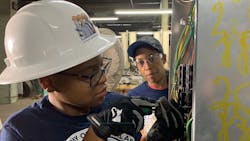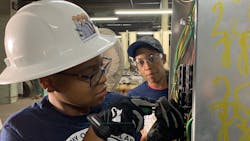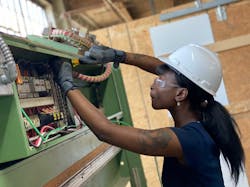Mastering the Chain of Command on Construction Job Sites — Part 1
If you are reading this, it’s probably safe to assume that you've survived the first month as an electrical apprentice. The whole experience can be overwhelming to take in: Every day you come back to the job site, it looks a bit different.
To grasp how all these moving parts work together, you must understand the chain of command on the job site and the company you’re working for (e.g., owner, stakeholders, project manager, superintendent, and foreman). Even if you are only reporting to one person, understanding how a project flows from start to finish can help you realize the importance of your role within the big picture. To get things started, here are two key job-site personnel terms to familiarize yourself with:
1. Electrical Project Manager
The electrical project manager (PM) is responsible for the successful completion and accuracy of the construction project(s). His/her duties and responsibilities include ensuring that the foreman, journeyman, and apprentices have clear directions on how the sequence of work should flow daily.
PMs must be knowledgeable in all areas of electrical construction and techniques, as well as have a working knowledge of contracts, project estimates, and construction specifications. Typical experience and educational requirements for this position may include, but are not limited to, an associate’s degree, bachelor's degree, or Project Management Professional (PMP) certification.
The PM should also monitor how the workforce and materials should be allocated throughout a project. If and when there are any deficiencies with material or missing information that affects progress, his/her job is to find remedies and solutions (e.g., gain approval for change orders, establish site logistics, and basically put out fires). As you work alongside your journeyman, take detailed notes for any material needed the next day or the following week. This will make everybody's job easier; your journeyman can't remember everything.
So be a team player — an asset they can’t live without. This is how you maintain control of project costs; you never want excessive waste or delays. The PM must perform financial forecasts, maintain quality assurance, and monitor on-site activities.
Eventually, your notes will make it to the desk of the PM; this is how material and resources get allocated to "your" job site (e.g., lifts, additional staffing, power tools, etc.). Take notes daily. If you see something that needs to be addressed (or might become an issue down the road), say something. "The squeaky wheel gets the most oil," so staying silent doesn’t help the project move forward.
The PM is also responsible for:
- Managing communications through document control and implementing standard operating procedures.
- Counseling and providing technical support and direction to other departments, assistant project managers, subcontractors, and vendors, as needed.
- Demonstrating company core values, culture, processes, and procedures.
2. Job-Site Superintendent
Running large commercial projects is a huge undertaking. Therefore, tasks must be planned methodically with other job-site management teams, sub-contractors, vendors, suppliers, and specialty trades.
Experience and educational requirements for this position may include, but are not limited to, an associate’s degree, bachelor's degree, master's degree, or Project Management Professional (PMP) certification, or a degree in engineering.
Coordinating these projects takes intellectual horsepower and a lot of technical rigor. Each step is planned down to the smallest detail, such as planning inspections, approving design details, and obtaining construction permits from the local authority having jurisdiction. To meet the project performance goals for each phase, the “Supe” must be punctual every step of the way to avoid delays and missteps.
Superintendents are usually stationed on the construction site, in their own job trailers with a project engineer, and typically work regular business hours from Monday through Friday (8:00 am to 5:00 pm). They follow, enforce, and ensure the safety and security of the job site. The Supe must effectively cooperate and share control with project managers from other teams and trades (e.g., plumbers, electricians, brick masons, HVAC, etc.).
Supes aren't typically hands-on with the construction process (so you won't see them with a toolbelt) due to their day-to-day responsibilities of delegating tasks to other Supes, engineers, and PMs from other teams.
The superintendent must strategically use his or her skills to:
- Lead and inspire by building a consensus at project planning through completion.
- Keep the project moving forward with clear, open communication while simultaneously providing constructive feedback to all parties involved.
- Run the day-to-day operations on the construction site, control the progress schedules, and maintain overall quality control.
- Make and advise decisions regarding finance-related tasks.
- Oversee design, labor, and material cost control.
Remember, these are both roles you can aspire to reach further along in your career. It’s never too early to begin building the life you want now! Plan your days with intention and purpose. Most of all, always be ready to be held accountable for your actions. You set the pace at which you go through this electrical journey, and your actions or inaction determine whether you achieve your goals.
De Loach, a master electrician and electrical trainer/instructor, is the founder of The Academy of Industrial Arts (www.taia-school.com) in Philadelphia. With more than 30 years of experience in the field, he will be writing regular exclusive content for E-Train and can be reached at [email protected].
About the Author
Harold De Loach
De Loach is the Director of Education and Training for the Leaders of Electrical License Preparation courses for Philadelphia and The Lehigh Valley (www.necprepclass.com). He is the founder and Director of The Academy of Industrial Arts L.L.C. (www.taia-school.com), a customized electrician training program that provides entry-level electrician training courses, electrical safety classes and customized electrical construction courses. He is trained by the National Center for Construction Education and Research (NCCER). He is a member of The National Society of Collegiate Scholars, the Independent Association of Electrical Inspectors, the Electrical Association of Philadelphia, and the Better Business Bureau.
His level of knowledge affords him to teach entry, intermediate, and master level electricians. Armed with more than 20 years of experience in the electrical, general construction, and real estate development industry, he offers his students and clients several unique skill sets. He has worked as the Head Craft Instructor and Assistant Director of Education at the Apprenticeship Training Center (affectionately known as The ABC School) in Harleysville Pennsylvania for Associated Builders and Contractors (The South-Eastern Pa. Chapter). Prior to Joining ABC, he directed a work-readiness (Re-Entry) Construction Technology program within The Philadelphia Prison System and as an Electrical Technician Program instructor at Kaplan Career Institute (Formerly Thompson institute) in Center City Philadelphia and Franklin Mills. He is available for consultation, private tutoring, speaking engagements, or strategic partnerships that can bolster the number of new electricians entering the industry.



